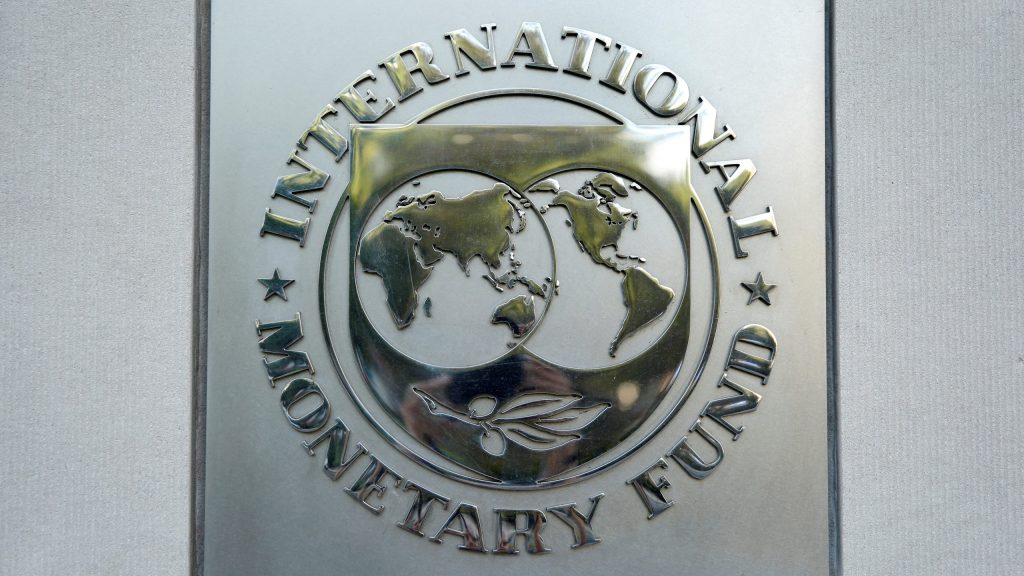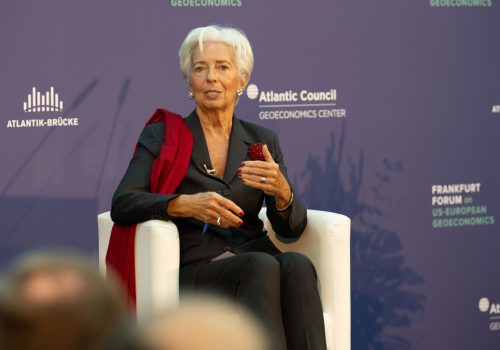On the eve of next week’s annual meetings of the International Monetary Fund (IMF) and the World Bank, the world is being confronted with a perfect storm of deepening stagflation with very high risks of a global recession and financial crises.
The COVID-19 pandemic and Russia’s war against Ukraine have caused significant economic disruptions, including shortages and rising prices for energy, fertilizer, and grains. But poorly timed policies and a lack of coordination among major countries have exacerbated these problems, pushing the global economy to the precipice.
The current economic crisis is something the IMF was designed to deal with—namely, to promote policy coordination among major countries to ensure the stability of the international monetary system. That’s why its ruling body, the International Monetary and Financial Committee (IMFC), which consists of finance ministers and central bank governors of member countries, must produce a coherent plan to help the world navigate the current dangerous situation.
This is especially urgent since the Group of Twenty (G20)—once the premier forum for policy cooperation and coordination—has descended into dysfunction thanks to geopolitical spats between China and Russia against the United States and Europe. If the IMFC fails to rise to the occasion, the IMF risks making news only by announcing downward revisions of growth estimates.
The following should be the IMFC’s three key priorities during next week’s meetings:
Promote coordination and stabilize exchange-rate movements
Among the policy failures that has aggravated stagflation, the US Federal Reserve was slow to tighten monetary policy when inflation started to accelerate, focusing on current instead of prospective inflation performance. It then tightened more aggressively than expected, sending shock waves throughout the rest of the world.
Meanwhile, the newly formed British government has adopted a major unfunded and uncosted tax-cut package despite the fact that public debt hovers around 100 percent of gross domestic product. That has led to market turmoil, the pound sterling dropping to record lows against the dollar, and historic selloffs in the British government bond market—requiring the Bank of England to intervene and restore order. Faced with adverse market reactions and political opposition, the government abandoned the part of the package that cuts the top 45 percent income tax rate.
For its part, the European Central Bank was among the last major central banks to raise rates as inflation in the eurozone reached 10 percent last month. Its task has been complicated by the war- and sanctions-related increases in energy prices and its desire to contain the government yield spread between Italy and Germany so as not to threaten the integrity of the euro. But that could conflict with the anti-inflation thrust of its monetary policy. The Italy-Germany spread—reflecting the credit risk of highly indebted Italy—has widened steadily recently to 240 basis points, a nearly three-year high. By contrast, the People’s Bank of China has continued to gradually ease monetary conditions to support a visibly slowing economy amid China’s strict zero-COVID policy.
Those uncoordinated, even contradictory, policies have significantly undermined consumer, business, and investor confidence, triggered sharp declines and heightened volatility in financial markets, and depressed economic activity. The Fed’s aggressive tightening has supercharged the dollar to multi-decade highs, creating serious problems for the rest of the world. In particular, the pound sterling has depreciated by more than 20 percent since the beginning of the year, falling to record lows against the dollar. The yen has also weakened by 20 percent, prompting the Bank of Japan to intervene significantly in foreign exchange markets, the first time in decades, while the euro has fallen by more than 15 percent (to below parity against the dollar). And the renminbi has also weakened by more than 11 percent against the dollar.
Overall, the depreciation of major currencies against the dollar has exacerbated inflation problems in those countries, forcing many of them to tighten—leading to a synchronized weakening of large economies to the verge of a global recession.
The IMFC needs to fulfill its mandate to promote the stability of the international monetary system—in this case, by coordinating coherent policies and avoiding excessive exchange-rate movements. At the very least, major member countries should acknowledge the international impacts of their domestic policies aiming to curb inflation. They should find ways together with other countries to manage the spillover effects of such policies—including measures such as foreign-exchange market intervention and temporary capital control. The Fed can also clarify that the strengthening dollar could play a role in determining the necessary magnitude of rate hikes. It should also more clearly communicate its policy goals, measures, and performance benchmarks, and—possibly in a coordinated way with other central banks—reduce the huge uncertainty prevalent in financial markets at the moment.
Individually, IMF members should be encouraged to align their fiscal and monetary policies to fight inflation and to avoid having those policies working at cross purposes. Policymakers need to find ways to encourage more supply instead of just focusing on reducing demand to tame inflation. They should also reverse recently imposed restrictions on food exports to avoid exacerbating the food crisis.
Help developing and low-income countries
Emerging-market and developing countries, especially low-income ones, have been battered the most, with the specter of famine even haunting some. Higher US interest rates and a stronger dollar have triggered net-portfolio capital outflows from emerging markets as investors have withdrawn a record seventy billion dollars from bond funds this year. Emerging-market stock and bond markets have declined more substantially—by 28 percent and 20 percent, respectively—than their mature-market counterparts. This has further tightened their financing conditions, reducing growth. Meanwhile, the slowing Chinese economy and weakness of the renminbi have made the products of those countries less competitive in Chinese markets, curtailing the growth of their exports to China.
The IMF should provide assistance to those countries in serious distress. It has about $140 billion in outstanding loans to forty-four member countries and has launched a new Food Shock Window under its emergency-lending instruments, the Rapid Credit Facility (RCF) and the Rapid Financing Instrument—both of which feature low conditionality. But while these measures are welcome, the IMF should do more to help its poor members cope with the extraordinary challenges. For example, it should increase the resources earmarked for the RCF and raise access levels to that facility beyond the normal 50 percent of quota (the share of each IMF member’s capital base reflecting its relative standing in the world economy) per year and 100 percent of quota cumulatively. In particular, the seven poor countries identified by the World Bank as suffering a combined food and debt crisis (Afghanistan, Eritrea, Mauritania, Somalia, Sudan, Tajikistan, and Yemen) should get expedited access to the Food Shock Window/RCF.
Promote a sovereign-debt restructuring framework
The IMF has been negotiating (or has already approved) assistance programs for several countries, including Zambia ($1.3 billion), Sri Lanka ($2.9 billion), Pakistan ($1 billion), and Argentina (a $3.9 billion second-tranche disbursement under the current thirty-month, $44 billion program), among others. The IMF should use these opportunities to press the recipient countries to request their creditors to form a country-specific Official Bilateral Creditor Committee and a Private Sector Bondholder Committee as well as communications channels between the two. These committees should discuss the parameters of a sovereign-debt restructuring deal being informed by the IMF/World Bank debt sustainability analysis of the country—more or less following the Zambia debt restructuring template. The suggestion would go beyond the provisions of the G20 Common Framework for Debt Treatment, which is only available to low-income countries; it will also help provide a needed structure for sovereign-debt restructuring, encouraging full participation of all creditors in the process. This is increasingly required as 60 percent of low-income countries and 30 percent of emerging-market countries are already in debt distress or crisis.
Hung Tran is a nonresident senior fellow at the Atlantic Council, former executive managing director at the Institute of International Finance, and former deputy director at the International Monetary Fund.
Further reading
Thu, Sep 22, 2022
The dollar has some would-be rivals. Meet the challengers.
New Atlanticist By Ananya Kumar, Josh Lipsky
What are the realistic alternatives to the dollar that US and allied policymakers should be paying attention to? And how can they respond?
Wed, Sep 28, 2022
The economic response that can match Putin’s escalation in Ukraine
New Atlanticist By Brian O’Toole, Daniel Fried
The G7 and the wider West have done a solid job targeting the Russian economy. Now, they need to keep up the pressure.
Wed, Sep 28, 2022
ECB chief Christine Lagarde: ‘Our primary objective is price stability’
New Atlanticist By
Europe's top banker shares her thoughts on the inflation crisis and much more during the Atlantic Council's Frankfurt Forum.
Image: The International Monetary Fund logo is seen at IMF headquarters in Washington, U.S., October 14, 2017. REUTERS/Yuri Gripas/File Photo



